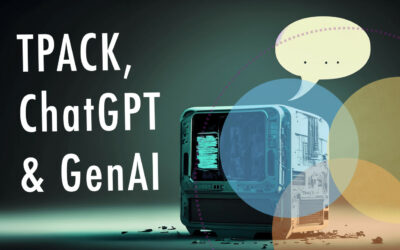I met Karin Forssell back in 2008 at the Las Vegas SITE conference when she was a doctoral student at Stanford University. She came and asked me if I was working with anybody at Stanford and I said, something along the lines of “not yet, but send me an email, that’s how collaborations start.” A couple of months later she did send me an email and, though we never did collaborate in the true sense of the word, we have kept in touch. So it gave me great pleasure to find out that Karin has finally submitted her dissertation.
Please take a moment to congratulate Dr. Karin Sigrid Forssell and wish her all the best for whatever path she chooses to follow. You can read the abstract below, or read the entire thing by following link but let me briefly point to two key results. First, her data showed that “TPACK confidence related to student use of computers in the classroom.” This is important since it indicates that teacher TPACK has an influence on what actually happens in the classroom. Now, this does not necessarily mean that there is higher student achievement (that was not the scope of the study) but it is an interesting finding none-the-less.
Second, and more significantly, Karin found that, “More varied learning resources and more productive social learning networks were associated with higher TPACK confidence. Three key types of support provided by learning partners — learning together, posing challenges, and connecting the teacher to others to learn from — were significantly more common among high-TPACK teachers.” Again a caveat is in order namely that it is not clear which direction the causal arrow points, i.e. do teachers with better networks develop better TPACK or vice versa but the existence of this connection is significant. My guess is that it some kind of a virtuous cycle where one strengthens the other and is in turn strengthened by it.
More details of her dissertation, title, link to PDF and abstract are given below:
Title: Technological Pedagogical Content Knowledge: Relationships to learning ecologies and social learning networks [PDF document]
Abstract: Improving learning experiences for all students is the ultimate goal of research in technology use in education. With more availability and better usability of technology in schools, the potential for teachers to use digital tools in schools is greater than ever. However a key factor determining whether new technologies are adopted is the extent to which teachers know how to use them to support students’ learning. The special knowledge of how technologies can support students’ learning of subject area content is known as technological pedagogical content knowledge (TPACK).
This study explored the relationship of accomplished teachers’ TPACK confidence to their use of technology with students and to their teaching and learning contexts. In an online survey, 307 National Board Certified teachers provided information about the frequency and breadth of their computer use with students; their use of computers in their personal lives; the school, classroom, and personal resources available to them for learning; and the people in their learning networks supporting their learning to use new technologies for teaching. Although the representativeness of the sample was limited and the measures self-reported, they provided rich opportunities to discover relationships and suggest avenues for supporting teacher learning of new technologies.
Analyses showed that these accomplished teachers’ confidence in their knowledge of how to use new technologies for teaching was different from their confidence in using technologies more generally. Further, TPACK confidence related to student use of computers in the classroom. No associations were found between TPACK confidence and age, gender, grade levels, subject areas, or student populations. However, confidence in teaching with technology did relate to measures of the teachers’ learning resources. More varied learning resources and more productive social learning networks were associated with higher TPACK confidence. Three key types of support provided by learning partners — learning together, posing challenges, and connecting the teacher to others to learn from — were significantly more common among high-TPACK teachers.
Findings in this study point to ways we might further understand, and subsequently increase, teacher confidence in using new technologies to support student learning. Several questions are raised for future research: Do learning resources lead to confidence in knowledge, or does confidence lead to awareness of existing resources? To what extent can TPACK be measured without first assessing the teacher’s PCK? And how might we develop survey measures that reliably capture the complexity of technological pedagogical content knowledge? Understanding TPACK and the conditions under which it develops is an important field of research, as we strive to help teachers learn to use new technologies effectively to support powerful student learning.



Congratulations Dr. Karin Sigrid Forssell!